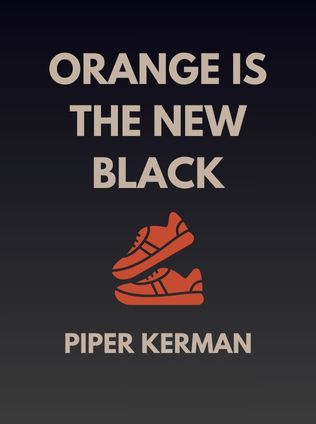
Orange is the New Black
By Piper Kerman
Published 04/2010
About the Author
Piper Kerman, the author of "Orange Is the New Black: My Year in a Women's Prison," is an American memoirist whose work has shed light on the harsh realities of the American criminal justice system. Born into an upper-middle-class family, Kerman grew up with the privilege of a stable home, excellent education, and a future brimming with potential. However, her life took an unexpected turn when she became entangled in a drug smuggling operation led by her then-girlfriend, Nora Jansen. This detour in her life, which eventually led to her incarceration, became the foundation of her memoir, in which she recounts her experiences with honesty, vulnerability, and insight. Kerman's writing is both a personal narrative and a social commentary, making her a significant voice in discussions about prison reform and justice in America.
Main Idea
"Orange Is the New Black: My Year in a Women's Prison" is not merely a recounting of Piper Kerman's time in prison; it is an exploration of the complex social dynamics within a women's prison, a critique of the American criminal justice system, and a personal journey of transformation. Through her experiences, Kerman highlights the systemic failures that perpetuate cycles of incarceration, particularly for women of color and those from underprivileged backgrounds. Her story is one of survival, self-discovery, and ultimately, a profound understanding of the humanity that exists even in the most dehumanizing environments.
Table of Contents
- The Descent into Incarceration
- Adjusting to Prison Life
- Finding Humanity in the Inhumane
- Systemic Failures and Personal Growth
- The Road to Redemption and Release
- Conclusion: Lessons Learned and the Path Forward
The Descent into Incarceration
Piper Kerman's journey to prison begins with a reckless decision made in her youth—a decision that would haunt her for a decade. Shortly after graduating from college, Kerman was seduced by the excitement of a relationship with Nora Jansen, a woman deeply involved in an international drug smuggling operation. Despite the allure of this dangerous lifestyle, Kerman soon realized the precarious position she was in. As she writes, “Nora thought little of putting me at great legal and physical risk if it meant more profit for the drug smuggling operation.” This realization led her to sever ties with Nora and attempt to rebuild her life on a more conventional path.
However, the past caught up with her when, years later, U.S. customs officials arrived at her door with an indictment for her involvement in the drug operation. Faced with the possibility of a long prison sentence, Kerman chose to plead guilty and accept her fate. This moment marked the beginning of her descent into the world of incarceration, a world vastly different from her life of privilege and stability. As she prepared to surrender herself to the Federal Correctional Institution in Danbury, Connecticut, Kerman's fear and uncertainty were palpable. She was about to enter a place where her identity as a privileged white woman would be both a shield and a target.
Self-Surrender and the Stripping of Identity
The process of entering prison was, for Kerman, the ultimate act of surrender—not just of her freedom, but of her identity. The dehumanizing intake process, which included a humiliating strip search, served as a stark reminder that she was no longer Piper Kerman, the well-educated, well-off woman from New York; she was now inmate #11187-424. The stark contrast between her former life and her new reality was epitomized in the foie gras sandwich she ate while waiting to be processed—a glaring symbol of the privilege she could no longer rely on.
"As I took that first bite, I felt like an alien, an interloper who didn’t belong in either world—too privileged for the prison system, yet condemned by my own past actions." - Piper Kerman
Kerman's initial experiences in prison were a crash course in the rigid routines and unwritten rules that governed life behind bars. She quickly learned that everything, from meal times to bed inspections, was dictated by a slow and often arbitrary bureaucracy. The sheer volume of rules was overwhelming, but she soon understood that they served to strip inmates of their autonomy and individuality, reducing them to mere cogs in the prison system.
Sign up for FREE and get access to 1,400+ books summaries.
You May Also Like
The Subtle Art of Not Giving a F*ck
A Counterintuitive Approach to Living a Good Life
By Mark MansonHow To Win Friends and Influence People
The All-Time Classic Manual Of People Skills
By Dale CarnegieFreakonomics
A Rogue Economist Explores the Hidden Side of Everything
By Steven D. Levitt and Stephen J. Dubner



















